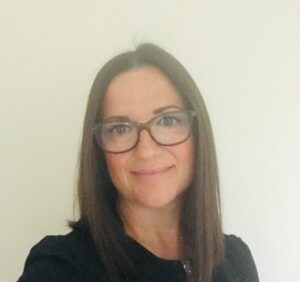
Innovation and a people-first culture go hand-in-hand for Samantha Dunne, Senior Software Manager at Discover. Together, they create the conditions that talented individuals need to thrive.
Here, she discusses her trailblazing role at the digital bank and payments company—and how she models the company’s vision for the future of banking through her leadership and her approach to challenges…
What attracted you to join Discover?
I knew some people who worked for Discover I respected and were happy there. The culture of a company and the people I work with are really important to me, and I felt there was a real people-first ethos here and a strong focus on creating innovative products—both of which appealed to me. Discover is also focused on individual growth, something I have experienced first-hand in my five years here, beginning as a test manager before moving to a principal quality engineer and being promoted to my current role as an engineering manager.
What innovative technologies are you involved with at Discover and what are the challenges and opportunities?
My teams look after the data that underpins our payment payments platform. In finance, however, what we consider ‘new tech’ isn’t necessarily what the rest of the world thinks is new tech. Fintech is such a highly regulated environment that things can’t move as fast as they do in other areas because we must be compliant and secure. At the moment, we are moving into the Cloud, and that means a complete transformation and the need to migrate our entire platform. Complex finance environments must be highly available to customers, so we can’t have downtime during this phase. A finance company can have a big infrastructure and critical systems that work, and so they don’t often want to touch them, but if you don’t keep moving forward as a company, then you get to a point where you actually can’t. We needed to move our data to a place where we know we will be supported long-term, and I’m grateful to work for a company that has vision. In the Fintech industry—where the most important thing is compliance and security—there is always this central challenge when moving forward.
What’s your role in this transformation and what is the most interesting part of it for you?
Nobody in the market has performed this kind of migration before, which makes it really interesting. We have to make sure we can migrate the data, and we also have to have contingency in case something goes wrong. It’s difficult because you don’t know what you don’t know, but that’s also what makes it very exciting. Things are always changing, so I’ve had to do a lot of re-planning, and it’s my responsibility to ensure we stay on track and resolve any issues along the way. If we hit a problem, it’s a case of asking, ‘Okay, who do we need to solve this?’ and then getting all those people talking together.
How do you foster innovation in your own teams?
I believe that work needs to be interesting and fun because if we enjoy what we do, we’re more likely to succeed in it, and that includes encouraging a culture of innovation. Last Christmas, we did exploratory testing; I told the team to go and find some programme bugs and made it into a competition. That gave people who don’t normally work on certain areas of the product the opportunity to go and learn those areas and have fun simultaneously. A couple of months ago, I also ran an Innovation Day. One part of our product needed a bit of a redesign to make it easier to work on. I split my team into those with some knowledge versus people without knowledge in that area and had them draw the area and develop a new design. That was an opportunity to think about what they were doing—plus, developers love to design things, which gave them the chance to do that.
What’s your leadership style and how do you model continuous learning as a value?
I suggest to my team members that they take a morning once a month and learn something they want to learn. I can’t physically make somebody go and learn something, but as a manager, I can make sure they have the time and the space to gain knowledge and to innovate. I also put a lot of emphasis in my leadership on communication. I don’t write code anymore, but I pair with developers so that I understand their experiences and pain points firsthand. So, even though I’m not as technical as I used to be, I continually work on my capacity to understand; you can’t communicate what you need to if you don’t understand what’s happening around you.
Is there anything on the horizon in Fintech that you’re particularly excited about?
Open banking is transforming the way we bank, and it’s something I’m very interested in. Discover is taking steps in that direction, and although it’s not in my sphere at the moment, it is going to change the future in terms of how we pay. It also feeds into issues such as diversity around what the human element brings to the tech. For example, some countries, such as the US, pay with QR codes rather than chip and pin, while in other places, it’s thumbprints; for the future of banking, we really need a diverse way of thinking and knowledge sets to move forward. I’m human, so I have unconscious biases, and that’s why it’s so important to have diversity in my team and throughout the industry—diversity in terms of gender, ethnicity and age, which is often overlooked. It’s a different world now to the one I grew up in, and digital accessibility and understanding for everyone is vital. We also shouldn’t devalue age and the experience that comes with that. I know I’ve learned valuable things through each job, and I carry that knowledge with me.
With constant evolution in the tech industry, how do you ensure your ongoing success?
I consciously think about continuous learning as I go along. Learning should be a natural part of your role, not just something you do in formal courses. I understood early on that it was important to really value what I was learning now and take that forward with me. I also don’t like making decisions if I haven’t the right data, so I will always go and look at the metrics first. Whether I want to change a process or adapt a plan, I use the data to help drive those decisions, and in that way, I know I’m making the right ones for what is needed.
What have you learned in your tech career that you wish you’d learned sooner?
When you’re talking to leaders and managers about challenges, it’s important that you come up with some options to open the conversation. If you want to raise a red flag or talk about a problem, go with at least two or three options of how you might solve that challenge. I think I’ve always tended to do that naturally, but as my career has progressed, I’ve realised the immense power of doing that consciously, and that practice is one I now drive with the people who report to me.



